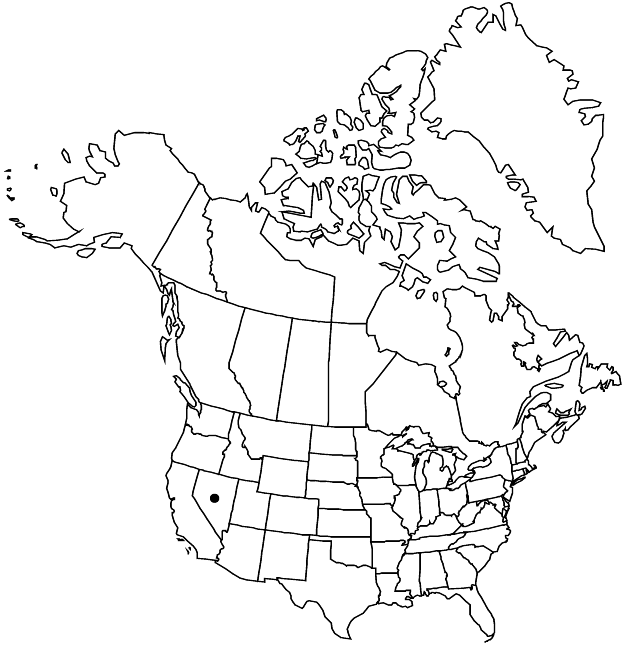Difference between revisions of "Eriogonum argophyllum"
Phytologia 23: 168. 1972.
FNA>Volume Importer |
FNA>Volume Importer |
||
| Line 25: | Line 25: | ||
|distribution=Nev. | |distribution=Nev. | ||
|discussion=<p>Of conservation concern.</p><!-- | |discussion=<p>Of conservation concern.</p><!-- | ||
| − | --><p>Eriogonum argophyllum is known only from the Sulphur Hot Springs area in Ruby Valley, Elko County, where plants grow along runoff channels associated with the hot springs. In 2003 the species was removed as a candidate for federal protection on the basis of “additional pop[ulation]s, individuals, habitat,” although it is still known only from the type location, where protection is provided by an interested private landowner. The species is considered to be “critically endangered” by the state of Nevada, and is in the Center for Plant Conservation’s National Collection of Endangered Plants.</p> | + | --><p><i>Eriogonum argophyllum</i> is known only from the Sulphur Hot Springs area in Ruby Valley, Elko County, where plants grow along runoff channels associated with the hot springs. In 2003 the species was removed as a candidate for federal protection on the basis of “additional pop[ulation]s, individuals, habitat,” although it is still known only from the type location, where protection is provided by an interested private landowner. The species is considered to be “critically endangered” by the state of <i>Nevada</i>, and is in the Center for Plant Conservation’s National Collection of Endangered Plants.</p> |
|tables= | |tables= | ||
|references= | |references= | ||
| Line 49: | Line 49: | ||
|publication year=1972 | |publication year=1972 | ||
|special status= | |special status= | ||
| − | |source xml=https://jpend@bitbucket.org/aafc-mbb/fna-data-curation.git/src/ | + | |source xml=https://jpend@bitbucket.org/aafc-mbb/fna-data-curation.git/src/8f726806613d60c220dc4493de13607dd3150896/coarse_grained_fna_xml/V5/V5_546.xml |
|subfamily=Polygonaceae subfam. Eriogonoideae | |subfamily=Polygonaceae subfam. Eriogonoideae | ||
|genus=Eriogonum | |genus=Eriogonum | ||
Revision as of 18:39, 18 September 2019
Herbs, matted, scapose, 0.5–0.9 × 1–2 dm, floccose, grayish. Stems matted, with persistent leaf bases, up to 1/5 height of plant; caudex stems matted; aerial flowering stems scapelike, erect, slender, solid, not fistulose, (0.4–)0.5–0.7 dm, floccose. Leaves basal, fasciculate in terminal tufts; petiole 0.05–0.1(–0.15) cm, tomentose; blade oblanceolate to elliptic, 0.4–0.8(–1) × 0.2–0.4(–0.5) cm, densely white-tomentose on both surfaces, margins plane. Inflorescences capitate, 0.5–1 cm; branches absent; bracts 5–6, lanceolate, scalelike, 2–2.5 mm. Peduncles absent. Involucres 5–7 per cluster, turbinate-campanulate, 2–2.5 × 2–2.5 mm, membranous, tomentose and sparsely glandular; teeth 6–7, erect to spreading, 1–1.5 mm. Flowers (2–)2.5–3 mm; perianth yellow, sparsely glandular; tepals connate proximal 1/4–1/2, monomorphic, oblong; stamens exserted, 3–3.5 mm; filaments pubescent proximally. Achenes light brown, 2.8–3 mm, glabrous except for minutely bristly beak.
Phenology: Flowering Jun–Sep.
Habitat: Moist, crusted, sandy, alkaline flats near warm springs, saltgrass and saltbush communities
Elevation: 1800-1900 m
Discussion
Of conservation concern.
Eriogonum argophyllum is known only from the Sulphur Hot Springs area in Ruby Valley, Elko County, where plants grow along runoff channels associated with the hot springs. In 2003 the species was removed as a candidate for federal protection on the basis of “additional pop[ulation]s, individuals, habitat,” although it is still known only from the type location, where protection is provided by an interested private landowner. The species is considered to be “critically endangered” by the state of Nevada, and is in the Center for Plant Conservation’s National Collection of Endangered Plants.
Selected References
None.
